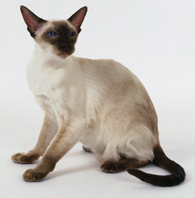Welcome to Petplan’s blog, a space where you can read up on the latest pet-news, find out interesting facts and tips about keeping your pets happy and healthy, and share your views on hot topics.
Refine articles by
clear searchWhat you need to know about FIV cats

Everything you ever wanted to know about Siamese cats

Known to 'talk' to their owners, the distinctive Siamese is one of the most popular and well-known feline breeds in the world. Originally from Siam, which we now know as Thailand, this breed is said to have descended from sacred temple cats owned by the royal family. Called Wichien-maat in Thai, meaning 'Moon Diamond', because of their trademark almond-shaped, bright-blue eyes, the breed was first seen outside Thailand in the UK. They were exported from Siam in 1884 by the then British consul-general in Bangkok Edward Blencowe Gould. He presented his cat-loving sister, Lilian Jane Veley, with a breeding pair of Siamese, which proved such a hit
How to control your food-aggressive rabbit

A: Rabbits can become aggressive over food because it is of high importance to them. In the wild, rabbits spend a lot of time foraging. Giving a pet rabbit a whole bowl of concentrated food may result in it 'defending' it. If your bunny has a good-sized hutch and run (as all rabbits should have), scatter the food on the floor or in the grass rather than in a bowl. Think about getting an activity feeder,
Keep your dog off the sofa - for good

A: Don't shout at her or tell her off, as this can be interpreted as confrontational and may make her grumpier. She's obviously
Which is better for your pet - wet or dry food?

PreparationMany owners regularly prepare specific food for their cat or dog, mix leftovers with commercial pet foods, or even serve up a portion of the family’s meal. But can they be sure that their pet is receiving the correctly balanced diet needed for optimum health? We have very different dietary requirements from dogs, and especially from cats, who are carnivores.
Water content and freshnessIt's often said of wet food that you're paying for water. This can, however, be an advantage for male cats,

